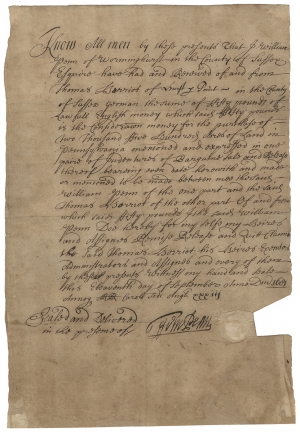|
William Penn Sells Land in Pennsylvania to English Yeoman in 1681 |
Click to enlarge:

Select an image:
William Penn deeds 2,500 acres of land in Pennsylvania to English yeoman Thomas Herriot in September 1681 for £50. A year later, Herriot accompanied Penn on the Welcome, bound for Pennsylvania but died on the voyage.
WILLIAM PENN.
Manuscript Document Signed, Deed to Thomas Herriot, September 11, 1681, Warminghurst, West Sussex, England. 1 p., 8¼ x 12 in.
Inventory #27208
Price: $7,500
Complete Transcript
Know All men by these presents that I William Penn of Worminghurst[1] in the County of Sussex Esquire have had and Received of and from Thomas Herriot of hurst y Point [Hurstpierpoint] in the County of Sussex yeoman the sume of ffifty pounds of Lawfull English money which said ffifty pounds is the Consideration money for the purchase of two thousand ffive hundred acres of Land in Pennsylvania mentioned and expressed in one pair of Indentures of Bargain Sale and Release thereof bearing even date herewith and made or mentioned to be made between mee the said William Penn of the one part and the said Thomas Herriot of the other part Of and from which said ffifty pounds I the said William Penn Doo hereby for my selfe my Heirs and Assignes Remise Release and Quitt Claim the said Thomas Herriot his Heirs Executors Administrators and Assignes and every of them by these presents Witness my hand and seale this Eleventh day of September Anno Dm 1681 Annoq RR Carolus Sndi Angl xxxiii[2]
Wm Penn
Sealed and Delivered
in the presence of
Historical Background
William Penn received a royal deed from King Charles II of England for the Province of Pennsylvania in 1681 to settle a debt of £16,000 that the king owed to Penn’s father. Penn established a proprietary colony (his “Holy Experiment”) on principles of democracy and religious freedom, especially for Quakers. He made his first visit to America in 1682, landing in October and founding the colonial capital of Philadelphia.
The first surviving deed by William Penn is dated July 14, 1681, to his then friend, business manager, and fellow Quaker Philip Ford (ca. 1631-1702), who later cheated Penn out of his title to Pennsylvania. That deed has the same form and text as this one, except for the name and amount of money and land involved. Herriot also apparently held a second deed for an additional 2,500 acres in Pennsylvania.
Thomas Herriot, his sister Mary (b. 1652), her husband grocer Dennis Rochford (b. ca. 1647), and their children traveled to America with William Penn aboard the ship Welcome to take possession of the land. Both Thomas Herriot and Dennis Rochford had subscribed £50 to the Free Society of Traders, which owned 20,000 acres in Pennsylvania. Thomas Herriot and two of the Rochford children died on the six-week voyage. In a will he made on September 19, 1682, Herriot left his estate to his brother-in-law Dennis Rochford and a legacy to his sister Anne Strate.
In 1685, Penn returned to England to aid his oppressed fellow Quakers there. He convinced King James II to allow Quakers to practice their religion in England as well as in America, but the king was soon exiled, and William and Mary ascended to the throne in 1688. Continuing to speak out against religious persecution, Penn was imprisoned in the Tower of London for two weeks in 1690. When Penn was charged with treason in 1692, his right to govern Pennsylvania was taken away, though he retained proprietary ownership of the colony.
William Penn (1644-1718) was an English Quaker and the founder of Pennsylvania. In 1681, King Charles II granted Penn a royal charter for a large quantity of his American land holdings for debts the king owed to Penn’s father. Penn arrived in 1682 and established the colony of Pennsylvania. He sailed up the Delaware River and founded Philadelphia to be the capital. He returned to England in 1684, but he again came to Pennsylvania in 1699 and stayed for two years. Later, settlers on the lower Delaware split away in 1704 to form what became Delaware. Penn was an early supporter of colonial unification and an advocate of democratic government. The embezzlement of his financial manager led Penn to debtors’ prison in 1707 at age 62. Sympathetic Quakers got Penn’s sentence reduced to house arrest and eventually obtained his release. He died penniless in Ruscombe west of London.
Thomas Herriot (bef. 1640-1682) was the son of John Herriot. Thomas Herriot appears on a list of purchasers of land in Pennsylvania, compiled by William Penn in March 1682. It authorized surveyor Thomas Holme to survey land to each purchaser, including 5,000 acres to Thomas Herriot. He subscribed £50 to the Free Society of Traders, a joint-stock company of merchants, landowners, and personal associates of William Penn, who were granted special concessions to encourage early settlement. Herriot died aboard the Welcome on its 1682 voyage with William Penn from London to Pennsylvania.
Condition: Overall Good; professionally cleaned and mended; incl. one fold separation that ran through Penn’s signature.
[1]William Penn purchased the Warminghurst Manor, 45 miles south of London, in 1676 with about 300 acres of land. He held secret monthly meetings for Quakers there until he left England in 1682 for his first visit to America. He sold the house and estate in 1707 to James Butler, who had it demolished, and built another house.
[2]“And in the year of the reign of King Charles II of England the thirty-third.”